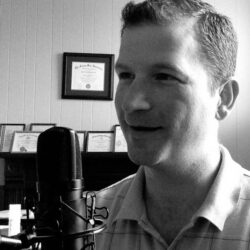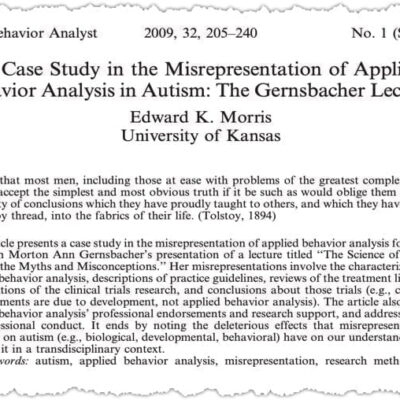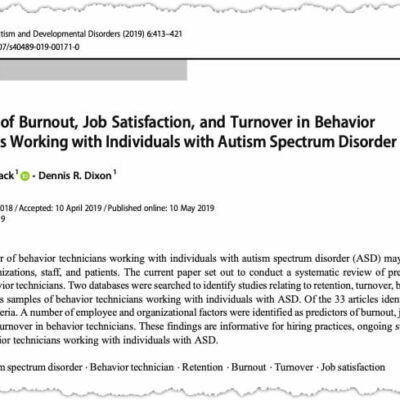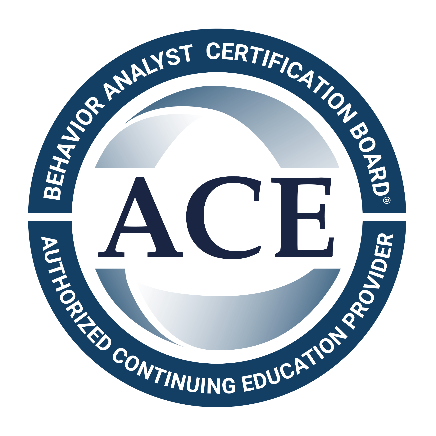ABA Terminology for Effective Practice
$9.99
BCBA CEUs: 1 Total CEU | 1 Ethics CEU
This tutorial provides both an introductory and practical review of what behavior-analytic terminology is, when you should use it, and the reasons why using it is so crucial to effective and ethical practice.
Description
To effectively practice your skillset as a behavior analyst and understand your responsibilities as you serve your client’s needs, you need to first have a thorough understanding of the basic principles that underlie the philosophies and practices of our field. These principles are represented by tasks in the Behavior Analyst Certification Board Fifth Edition Task List. The technical terminology that embodies these principles is key to effective and ethical practice.
It is important to discriminate the differences between mentalistic, non-technical, and technical terminology and to understand the contexts in which each is appropriate. This tutorial provides both an introductory and practical review of what behavior-analytic terminology is, when you should use it, and the reasons why using it is so crucial to our effectiveness as practitioners. It will also highlight our ethical obligation to use accurate and precise terminology, particularly as it relates to communicating about services, collaborating with colleagues, and documenting professional activity.
This tutorial is written for practitioners having a bachelor’s or master’s degree in behavior analysis. However, other professionals can benefit. Practitioners having a Ph.D. in behavior analysis should find this tutorial to be a helpful review of content with which they may be already familiar. Individuals preparing to take the BACB exam will find that this content supports tasks listed in the BCBA 5th Edition Task List and the Ethics Code for Behavior Analysts. Finally, professionals from other disciplines will gain a greater understanding of why behavior analysts adhere to such accurate and precise terminology.
About the Authors
Melissa C. Mackal, Ph.D., BCBA
 Dr. Melissa Mackal is the Managing Director and Owner of Global Behavioral Health. She holds a master’s degree in clinical psychology and doctorate in Instructional Systems and Learning Technologies as well as being board certified in behavior analysis. She began her behavior analysis journey in the early 1990’s working in New Jersey and in conjunction with local schools catering specifically to children with autism. She continued her career in Florida as a certified behavior analyst in both the private and public sectors. It is there where she completed her doctorate at Florida State University under the tutelage of Dr. Walt Wager and other esteemed faculty within the ISD program and School of Education. She has over 15 years of instructional design experience, having designed and developed training and performance solutions in a wide array of domains: behavioral and clinical care, corporate, non-profits, industry, and military.
Dr. Melissa Mackal is the Managing Director and Owner of Global Behavioral Health. She holds a master’s degree in clinical psychology and doctorate in Instructional Systems and Learning Technologies as well as being board certified in behavior analysis. She began her behavior analysis journey in the early 1990’s working in New Jersey and in conjunction with local schools catering specifically to children with autism. She continued her career in Florida as a certified behavior analyst in both the private and public sectors. It is there where she completed her doctorate at Florida State University under the tutelage of Dr. Walt Wager and other esteemed faculty within the ISD program and School of Education. She has over 15 years of instructional design experience, having designed and developed training and performance solutions in a wide array of domains: behavioral and clinical care, corporate, non-profits, industry, and military.
Robert Wallander, Ph.D., BCBA-D
 Robert Wallander received his Bachelor of Science in psychology from at Drake University under Scott Wood, his Masters in ABA from Western Michigan University under Jack Michael and his Ph.D. in psychology at The Florida State University under Jon Bailey. Dr. Wallander has been in continuous applied practice for 30 years following his receipt of a Master’s Degree and Florida Certification in 1993. Now a BCBA-D and Licensed Behavior Analyst, Dr. Wallander is has practiced in residential, school and community settings, teaching behavioral analysis and conducting research on behavior analytic topics range from complex verbal relations, functional assessment procedures, and technical aspects of evidence-based therapies. Dr. Wallander’s interest in the topic of how terminology affects clinical quality and effectiveness when a student of Dr. Jack Michael’s at Western Michigan University. Arguments made for mastering technical language for the purpose of improving ABA’s ability to be socially valid were learned there and continue to the present in which Dr Wallander teaches both precise terminology and illustrates how this is connected to and delivery of socially valid outcomes. Currently, Dr. Wallander has focused his research into the advanced verbal behavior of experts who examine graphed or otherwise summarized data and generate clinical recommendations. Specifically, he has incorporated the “think aloud” methodology and protocol analysis to study these phenomena for the purpose of standardizing and improving clinical decision making for all practitioners. To facilitate the study and reporting of his findings, he founded The Principal Research Group, a collective brings of scientists, authors, and practitioners who examine expertise in clinical thinking.
Robert Wallander received his Bachelor of Science in psychology from at Drake University under Scott Wood, his Masters in ABA from Western Michigan University under Jack Michael and his Ph.D. in psychology at The Florida State University under Jon Bailey. Dr. Wallander has been in continuous applied practice for 30 years following his receipt of a Master’s Degree and Florida Certification in 1993. Now a BCBA-D and Licensed Behavior Analyst, Dr. Wallander is has practiced in residential, school and community settings, teaching behavioral analysis and conducting research on behavior analytic topics range from complex verbal relations, functional assessment procedures, and technical aspects of evidence-based therapies. Dr. Wallander’s interest in the topic of how terminology affects clinical quality and effectiveness when a student of Dr. Jack Michael’s at Western Michigan University. Arguments made for mastering technical language for the purpose of improving ABA’s ability to be socially valid were learned there and continue to the present in which Dr Wallander teaches both precise terminology and illustrates how this is connected to and delivery of socially valid outcomes. Currently, Dr. Wallander has focused his research into the advanced verbal behavior of experts who examine graphed or otherwise summarized data and generate clinical recommendations. Specifically, he has incorporated the “think aloud” methodology and protocol analysis to study these phenomena for the purpose of standardizing and improving clinical decision making for all practitioners. To facilitate the study and reporting of his findings, he founded The Principal Research Group, a collective brings of scientists, authors, and practitioners who examine expertise in clinical thinking.
Learning Objectives
Upon completing the tutorial, the learner should be able to:
- Discriminate the differences between mentalistic, non-technical, and technical terminology
- Explain how terminology can be accurate and precise
- Explain why using accurate and precise terminology is important
- Identify when the use of non-technical and technical terminology is appropriate
Content
You can access two sample lessons for free below. Please note that your progress on sample lessons is not tracked or recorded.
Module Content
43 reviews for ABA Terminology for Effective Practice
| 5 star | 79 | 79% |
| 4 star | 16 | 16% |
| 3 star | 0% | |
| 2 star | 2 | 2% |
| 1 star | 2 | 2% |
Sorry, no reviews match your current selections
You may also like…
-
BundleSale!

32 Total BCBA CEUs
4 Ethics CEUs3 Supervision CEUs25 General CEUsGalactic Bundle
5.00 out of 5(1)$319.87Original price was: $319.87.$216.98Current price is: $216.98. Add to Cart Quick View -
Multimedia Tutorial

7 BCBA CEUs
An Introduction to Relational Frame Theory (RFT)
Eric J. Fox4.55 out of 5(503)$69.99 Add to Cart Quick View -
Article Quiz

3.5 Total BCBA CEUs
3.5 Ethics CEUsA Case Study in the Misrepresentation of Applied Behavior Analysis in Autism: The Gernsbacher Lectures
Edward K. Morris4.39 out of 5(57)$34.99 Add to Cart Quick View
Related products
-
Interactive Video

1.5 BCBA CEUs
Chomsky vs. Skinner: In Their Own Words
Noam Chomsky & B.F. Skinner4.77 out of 5(22)$14.99 Add to Cart Quick View -
Interactive Video

1.5 BCBA CEUs
B.F. Skinner on Education
B.F. Skinner4.94 out of 5(32)$14.99 Add to Cart Quick View -
Article Quiz

1 Total BCBA CEU
1 Supervision CEUPredictors of Burnout, Job Satisfaction, and Turnover in Behavior Technicians Working with Individuals with Autism Spectrum Disorder
Marlena N. Novack & Dennis R. Dixon4.56 out of 5(50)$9.99 Add to Cart Quick View





I found this course valuable as a way to better understand the nuances of communicating with other professionals as well as those in the field of ABA.
Terminology break down. Informative
Good format for presenting the information. The case studies are useful.
The examples were my favorite part. Very informative and refreshing.
I am an SLP and a BCBA. I think this module can help SLP’s communicate with BCBA’s and vice versa, about some of the fundamental differences between our fields. I loved learning about Skinner’s analysis of verbal behavior as it applied to clients I was treating as an SLP, so much so that I became a BCBA. I’d recommend this to any fellow SLP’s who are interested in becoming better at shaping behavior, particularly verbal behavior.